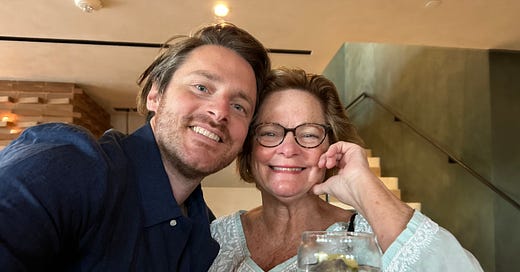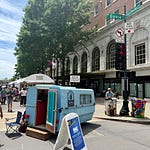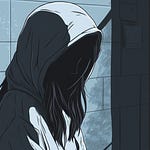I thought it would be fun to analyze a confession with my mom, Reverend Doctor Susan Lukens, and get her priestly advice (she’s Episcopalian) for our confessor. I put almost no forethought into which confession to give her. You’ll soon see that after listening she assumed otherwise. What unfolded was a pretty in depth conversation about a core family trauma of hers, secrecy, love, and the price of hard parental decisions.
Walker: Can you summarize what this confession was about?
Susan: Well, it was about siblings.
One, specifically, who finds out that her brother is not biologically her brother. In fact, he has another father. And the issue is that she goes to her other siblings and family members and says, “does Noah know?” Noah is the brother. Then, it just ends. So you don't know how it goes from there, but you can imagine how it goes from there.
‘Cause it's a very deep hurt. There's sort of a gossipy idea of it, but it's really not gossipy. I don't think it's like, ‘oh my God, we thought Noah was our brother and he's not.’
And then there's the sins of the parents. Like, “how come you didn't tell us?” and maybe it's not simple. Maybe it's wonderful. Maybe there was a love affair that created Noah, and it was just kind of kept in the closet.
Then on the other side of it is, what is love? Like, these are just your brother and your sister, who you've always called brother and sister. Does it make any difference if you're a young adult and you suddenly find out you're not the same blood? You love them. So that's really heavy.
Walker: It’s interesting the way you frame it. I only thought about the sins of the parents, which was that they had never told this kid, but you're right. There could totally be virtuous reasons for maybe not telling the child that their siblings aren't their biological siblings.
Susan: To put a sort of splashy word to it, maybe there's a romance. Maybe the biological father of Noah was a true love [of Noah’s mother] and something happened. I'm not saying death or anything, but something happened and he walked away from the family structure.
I don't know if this is why you sent it to me, because you know I'm very close to my siblings, but there was sort of this implication of gossip. Like, there's always talk between siblings. I know you and your brother and your sister talk about me.
It's good and bad, but that's just the nature of it. Because you have siblings, I know you understand that I talk to my siblings. That doesn't mean the talk is toxic, or like what we call nasty middle school gossip. I'm a girl. Believe me, girls gossip. I don't know so much about guys.
So when I heard this. I thought, ‘oh my gosh’, you're trying to send me a message! The truth is that I can sort of relate to it because your grandfather, Papa. His [biological] father committed suicide.
Walker: Yeah.
Susan : And I never knew that. I can’t tell you when I found out the real story. I think I was already a mother so I had to be in my thirties. And I find out and it's really sad because he committed suicide. It wasn’t that he died like how they’d previously told us.
Walker: He committed suicide when both of his sons were infants. So he committed suicide at probably the hardest possible time for his wife.
Susan : And why? The point is that I found out, but then I'm like but I love my Papa. I loved my Papa. He's dead now. just to clarify.
Walker: You loved your step grandfather, not your biological one. Your biological grandfather committed suicide and you really loved your step grandfather. So for you, it didn't change anything that this other guy had committed suicide.
Susan: Nothing. My Papa was the life of the room. My Nana was a little stern. She was just kind of…that's just the way Nana was, but Papa was the life of the room. And so, in the end, does it matter? No. Full stop.
Also, I wonder if some traits that I have, and that I see now in my children, do they come from my real grandfather who I didn’t know? They're called the Wilders.
Like, the music side of it. The artistic side. The grouchy side. The humorous side. You and your sister are so funny. You need to be stand up comics. Is that a Wilder trait?
So, Noah and his siblings find this out. All this time she thought one way and then, ‘Oh no.’ That’s like me.
Walker: Yeah, wow.
Susan: It doesn't matter, but it does matter. Because you want to have real gratefulness and to say, ‘I have a sense of humor because of blank, blank, blank.’ Nurture versus nature, right?
So, that's why I like that little story [the confession]. It's really heavy duty.
Walker: Yeah, there's a lot going on and it's less than a minute long. It packs a punch.
Susan: Yeah, I sort of want episode two. Who's going to tell Noah?
And then think of your own self. You have a mom, you have me. You have your dad, though he's not here anymore. You have a sort of like, you know, your heritage, so to speak.
Walker: Yeah…
Susan: How's Noah gonna feel? I have a bishop friend who is amazing and in his late fifties. He knew he was an orphan, and his wife finally convinced him to find his real mother. To know the story, and he did. So, go to Noah, like, is that what Noah's going to do?
So what's episode two?
Walker: Well, because of how our project is, there will never be an episode two. So that is the thing, right? Now that we've sort of talked this through and your perspective is sort of fleshed out a bit here, I have two questions for you as a priest.
In your professional capacity, how would you advise this woman? Basically what she was saying was, ‘I know this.’ My brother doesn't know, but people in the family know now. So how would you advise her?
Susan: What I would say to her is, “Now that you know this about Noah, do you love him less?”
That's number one. And I would hope she'd say no, but if she says yes, then I would say, “in fact, you've always loved him even though you now know the truth of his origin.”
Let's pretend the parents are still alive, because I don't know if they are. If they're still alive, I would say to her, this isn't your story to tell. This is on them and you need to go to them and tell them ‘I'm upset and all of us are talking about it.’ In the end, it's not her story, nor is it her job while the parents are alive to tell him these truths, but she's got to be honest with the parents.
If the parents have already deceased or have dementia and can't be a part of it then it's still not her story to tell because it's about love. And do you love somebody because of X, Y, Z? You just love them. Or, don't. I'm just assuming they have a good relationship. But every relationship goes up and down, right?
But it's about love. What's the blood part of it?
Walker: Yeah, I think that's true. To your point and thinking about my papa, your father, he was so sad finding out later in life. Is it fair that her brother doesn't know the truth about where he's from? Is that fair?
Susan: Is it fair because other people know?
Walker: Yeah.
Susan: Uh, yeah, kind of. No, it's not fair, but I go back to [the fact] that the siblings weren’t a part of why this happened.
Walker: So your official position is that it's not her business. She shouldn't be the one to tell, and no one has to tell him.
Susan: Correct.
Walker: Okay.
Susan: Okay but look at the good side of it. You know, cause again, I go back to my dad, your papa, who never talked about it until he was almost 80. I can remember the night in their apartment in New York. You know the scenario, sitting at the table looking at [family] pictures, and he just mentions, “Oh, there that is a really Wilder look.” That was it. I was so shocked that dad would mention it. I couldn't talk about it. Because I wanted to respect that my dad never talked about it nor did he ever call my Papa, his stepfather, dad. He called him Hal. His name was Harold. He called him Hal his whole life, but I never questioned that.
So do you see how deep that is? Holy moly. It's deep. It's really deep. And human nature is to say, let's get a little juicy. Oh, it was this, or an affair and unfaithfulness or, you know, something like that. Forget it. It's life.
Walker: Yeah, but you seem to be suggesting that maybe no one should have ever told Papa that that's how his real father actually died.
Susan: You've got to go in the context of the day. I mean that sincerely. It was a long time ago, you know, pre World War Two, okay? That's in the 1930s. Just as an example, when my parents divorced in the late sixties, early seventies. I never told anyone. So jump back to the 1930s, to say that your father committed suicide? You got to go to the context. Jump forward to today.
How do you define family now?
Walker: Like–
Susan: It's not just mother, male, woman, male, female, children. It's just not that way so, I don't know. I think Noah, in the end, should know, but maybe not. I don't know. Maybe not.

















Share this post